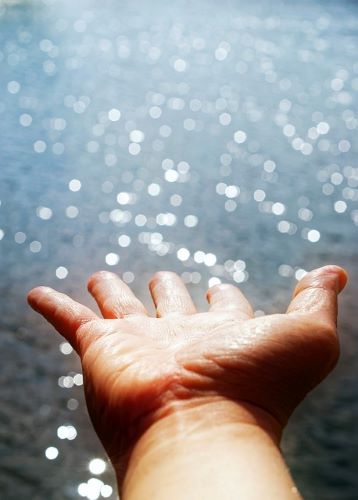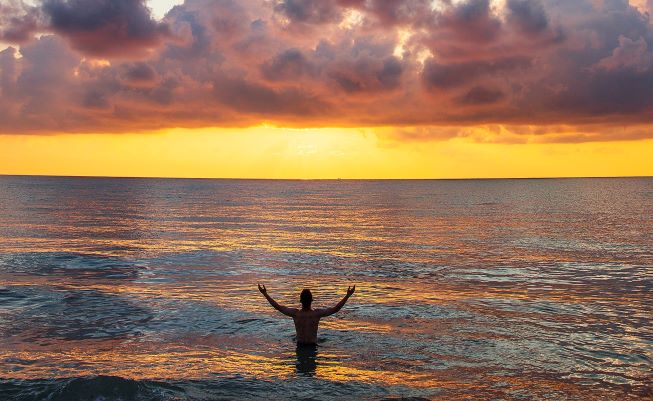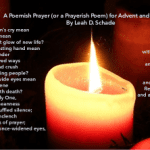Baptismal water, light, and Spirit call us into our vocation as Christians to protect God’s Creation.

Here are ideas for reading and preaching Genesis 1:1-5 and Mark 1:4-11. These texts are assigned as part of the Revised Common Lectionary for the First Sunday after Epiphany, the Baptism of Jesus. This is part of the EcoPreacher 1-2-3 series to equip preachers and congregations for engaging the Bible through an ecological lens.
Eco-Exegesis
Eco-exegesis is a method of interpreting the biblical text through a green lens using the principles of ecological theology.
Genesis 1:1-3
In the beginning when God created the heavens and the earth, 2the earth was a formless void and darkness covered the face of the deep, while a wind from God swept over the face of the waters. 3Then God said, ‘Let there be light’; and there was light.
According to Jewish tradition, “since the sun was not created until the fourth day (see Genesis 1:16), the light God created on the first day of creation was not a physical light but a spiritual one. Rabbi Sholom Berezovsky teaches that ‘without this holy light there is no merit in sustaining creation.’ Those who seek God perceive this spiritual light. The sustainability of creation therefore depends on the spiritual awareness of humanity.” (Eco Bible, 4, quoting Rabbi Shalom Berezovsky, Netivot Shalom (Jerusalem: Yeshivat Beit Avraham Slonim, 2000), Number 41.)
As the new year begins, this is an ideal time to reorient our spiritual compass toward the divine wisdom and love that illuminates the entire universe.
During the season of Epiphany, a preacher can point to the heavens revealing God’s glory, infusing a sense of awe and wonder in the vast complexity of the cosmos.
At the same time, this light is juxtaposed against the dark waters of the deep covering the Earth. Then, with a great sighing breath, God’s Spirit moves over the surface of the watery planet, setting life into motion. Water, light, and air (Spirit) are the elemental elements in the opening verses of Genesis.
Later, dry land will appear, but at this stage of creation, the Earth is a formless void. “God said that dry land should appear from the water,” Rabbis Yonatan Neril and Leo Dee remind us. “Yet by humanity’s actions, more and more water is covering land” (Eco Bible, 5). According to NASA, global warming due to humans burning fossil fuels has led to melting ice caps and glaciers at a loss of 270 billion tons per year over the past two decades (“Ice Sheets,” Global Climate Change: Vital Signs of the Planet, NASA). In turn, sea level rise is regularly flooding coastal towns and low-lying parts of major cities.
This is an undoing of God’s good creation and God’s intention for life on this planet to flourish.
This undoing is directly tied to humanity losing sight of the holy light and the sanctity of this planet that God called “good” seven times in Genesis Chapter 1. On this Sunday celebrating the baptism of Jesus, it is imperative to understand that these ancient Jewish texts establish the priority of caring for God’s Creation as part of our baptismal vocation.

Mark 4:9-10
In those days Jesus came from Nazareth of Galilee and was baptized by John in the Jordan. 10And just as he was coming up out of the water, he saw the heavens torn apart and the Spirit descending like a dove on him.
It’s not a coincidence that the inauguration of Jesus’s mission takes place surrounded by water, light, and Spirit (air) the same elements present at the beginning of Creation. Just as spiritual, holy light illuminates the universe at the beginning, so the heavens “tear apart” and the Spirit (ruah in Hebrew) descends on Jesus. The Spirit appears as a dove at the Jordan River just as she flew over the waters of the deep in Genesis 1:2.
As poignant as this baptismal story is, the reality is that the climate crisis is tearing apart these elements of Creation, and not in a way that is revealing of heavenly illumination. As Korean theologian Seoyoung Kim writes, “Climate anxiety—fear for survival—is spreading to all life on earth: water unites all living beings and all places, and the threat of death due to lack of water exposes how dependent we are” (“Water of Life in South Korea,” Seoyoung Kim, Words for a Dying World: Stories of Grief and Courage from the Global Church, Hannah Malcolm, editor (London, UK: SCM Press, 2020), 110).
Yet, faith communities are responding to this planetary crisis.

In a historic moment on October 4, 2023, twenty-nine U.S. denominations and faith organizations joined together to launch One Home One Future. Convened by ecoAmerica’s Blessed Tomorrow, this is a multi-faith campaign to strengthen vitality, relevance, and community connection across generations to care for Creation in local congregations nationwide.
The website has lists of actions your church can take within any number of the seven pathways to educate, activate, and empower clergy, congregants, youth, and all people in meaningful and just climate solutions at the local, regional, and national level. You can explore the congregational toolkit which has a breadth of resources and tools relevant for your faith tradition here. It also gives participants the opportunity to connect and collaborate with other faith leaders and congregations within and across faiths nationwide.
1 Eco-Idea
The Eco-Idea is one succinct statement that tells us who God is and/or what God does in relation to Creation and how we should respond as people of faith.
Baptismal water, light, and Spirit call us into our vocation as Christians to protect God’s Creation.
2 Eco-Questions
Eco-Questions are what we can ask to help a congregation draw out the implications of the Eco-Exegesis and Eco-Idea.
- What aspects of God’s Creation fill you with awe and wonder? How do you feel when you see the expanse of stars in the night sky? Or the expanse of water stretching from the shoreline? How does this expand your faith in God?
- What aspects of the climate crisis are most acute for you right now? What are your “new year’s resolutions” for joining with other people of faith to address these crises?
3 Eco-Actions
Eco-Actions are ways that a congregation might respond to the Eco-Idea and Eco-Questions. One of these possibilities may have salience for your ministry context.
- Visit the One Home One Future website organized by Blessed Tomorrow, order your banner, and display it in front of your house of worship.
- Visit the EPA’s How’s My Waterway to find out the name of your local watershed and learn about the condition of your local waters based on data that states, federal, tribal, local agencies and others have provided to the agency.
- Commit to including some aspect of Creation in every worship service of the coming year. This can be through hymns, prayers, Scripture readings, sermons, and testimonials about ways in which the congregation is living out their baptismal vocation to care for God’s Creation.
Read also:
A Theology of Water: Responding to Our Baptismal Vocation
The Healing Power of ‘Moonlight’: Race, Erotic Love, and Baptism
5 Steps for a Healthy Pastor, Congregation, and Planet
EcoPreacher 1-2-3 is a partnership between the Rev. Dr. Leah Schade and the Interfaith Center for Sustainable Development, publishers of Eco Bible, a Jewish ecological commentary on the Hebrew Scriptures. EcoPreacher 1-2-3 provides Creation-centered sermon preparation that is short, accessible, and based on a solid biblical foundation. To see other EcoPreacher ideas and to sign up to receive future EcoPreacher 1-2-3 installments, click here.

The Rev. Dr. Leah D. Schade is the Associate Professor of Preaching and Worship at Lexington Theological Seminary in Kentucky and ordained in the ELCA. Dr. Schade does not speak for LTS or the ELCA; her opinions are her own. She is the author of Preaching in the Purple Zone: Ministry in the Red-Blue Divide (Rowman & Littlefield, 2019) and Creation-Crisis Preaching: Ecology, Theology, and the Pulpit (Chalice Press, 2015). She is the co-editor of Rooted and Rising: Voices of Courage in a Time of Climate Crisis (Rowman & Littlefield, 2019). Her newest book is Introduction to Preaching: Scripture, Theology, and Sermon Preparation, co-authored with Jerry L. Sumney and Emily Askew (Rowman & Littlefield, 2023).













